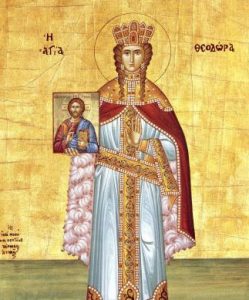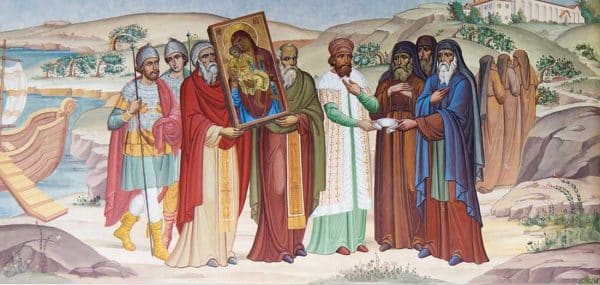Who was Saint Theodora
Theodora the Empress (c. 500 – 548 AD)
 Empress Theodora was one of the most influential and powerful empresses of the Byzantine Empire and a saint in the Eastern Orthodox Church. She was the wife of Emperor Justinian I and co-ruled with him from 527 until her death in 548. Theodora’s early life, before marrying Justinian, was marked by humble beginnings, and she was said to be an actress, which was a profession looked down upon by contemporary society.
Empress Theodora was one of the most influential and powerful empresses of the Byzantine Empire and a saint in the Eastern Orthodox Church. She was the wife of Emperor Justinian I and co-ruled with him from 527 until her death in 548. Theodora’s early life, before marrying Justinian, was marked by humble beginnings, and she was said to be an actress, which was a profession looked down upon by contemporary society.
Theodora met Justinian before he became emperor, and upon his ascension to the throne in 527, she became his co-regent. Her intelligence, political acumen, and strong will played a significant role in the governance of the empire. She is particularly noted for her decisive actions during the Nika riots in 532, where her resolve and counsel were credited with saving Justinian’s reign.
Religious Influence and Reforms
Theodora was a staunch supporter of the Miaphysite doctrine, which was in opposition to the Chalcedonian definition accepted by the majority of the Byzantine Church and Empire. Her religious convictions led her to support Miaphysite Christians who were persecuted and to advocate for religious tolerance.
Theodora also implemented significant social reforms, particularly concerning the rights of women. She passed laws prohibiting forced prostitution, established safe houses for women, and amended divorce laws to give more benefits to women.
Theodora’s legacy is complex, shaped by her profound influence on Byzantine politics, religion, and social reforms. Her life and reign have been the subject of both admiration and controversy, documented by historians such as Procopius. In the Eastern Orthodox Church, she is venerated as a saint, celebrated for her piety, charitable works, and role in restoring the veneration of icons.
Theodora of Alexandria (5th Century)
Saint Theodora of Alexandria is another celebrated figure, though her life is enveloped in hagiographical legends. She is known for her repentance, ascetic life, and the extraordinary tale of her disguised monastic life.
Theodora, according to tradition, was a married woman from Alexandria who, after committing adultery, chose to repent for her sins in a unique and extreme way. She disguised herself as a man and entered a monastery under the name “Theodore.” Living as a monk, she gained a reputation for holiness and asceticism.
The legend narrates that Theodora, still disguised, was falsely accused of fathering a child with a local woman. Accepting the accusation without defense, she was expelled from the monastery. She lived outside the monastery, raising the child, and continued her ascetic practices until her true identity was revealed upon her death.
Saint Theodora of Alexandria is venerated for her extreme humility, repentance, and dedication to God. Her feast day is celebrated on September 11 in the Eastern Orthodox Church. Her story is often cited as an example of humility, the power of repentance, and the possibility of redemption and a new life in Christ.
